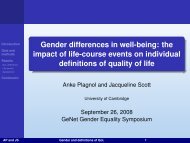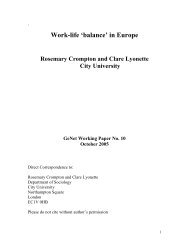Job insecurity, gender and work orientation: an exploratory ... - GeNet
Job insecurity, gender and work orientation: an exploratory ... - GeNet
Job insecurity, gender and work orientation: an exploratory ... - GeNet
Create successful ePaper yourself
Turn your PDF publications into a flip-book with our unique Google optimized e-Paper software.
i) <strong>Job</strong> <strong>insecurity</strong> as major crisis<br />
The three women in this group were all divorced, the sole breadwinners in their<br />
family <strong><strong>an</strong>d</strong> had school age children to support. Their overriding concern was with the<br />
economic costs of job loss. That said, however, they all emphasised the social losses they<br />
would have to contend with. For each of the women, some of their <strong>work</strong> colleagues had<br />
become key sources of support. One wom<strong>an</strong>, a full-time FE lecturer with a 4-year-old<br />
child, had no contact with her ex-husb<strong><strong>an</strong>d</strong> <strong><strong>an</strong>d</strong> was living at some dist<strong>an</strong>ce from her<br />
parents <strong><strong>an</strong>d</strong> siblings:<br />
I don’t have local family around – the extended family – I don’t have that<br />
here. So yes, my friends here relieve a lot of stress for me, they look out for me …<br />
losing them would be a disaster.<br />
In terms of both practical help <strong><strong>an</strong>d</strong> emotional support, her <strong>work</strong> colleagues had become<br />
‘like family’. However, although social support from her colleagues was crucial given the<br />
absence of family support, org<strong>an</strong>izational support was less forthcoming. It is interesting<br />
to note here that she seems to bear a resembl<strong>an</strong>ce to Crompton’s ‘Careerist by Necessity’.<br />
While she had expressed a preference for a reduced hours schedule, <strong>an</strong> underst<strong><strong>an</strong>d</strong>ing of<br />
the impossibility of achieving that goal, not just personally, but org<strong>an</strong>izationally, had<br />
‘forced’ her into a breadwinning role <strong><strong>an</strong>d</strong>, with it, the corresponding worries about the<br />
fin<strong>an</strong>cial consequences of job loss:<br />
If I had a partner, say, who was very fin<strong>an</strong>cially secure <strong><strong>an</strong>d</strong> I didn’t have to<br />
worry, I think I would have gone to point 5 [a 30 hour week]. So I would have<br />
ch<strong>an</strong>ged the situation, yes, if I could do it fin<strong>an</strong>cially, I would do point 5 … But I<br />
do have to worry … yes, it’s the money that’s the real worry now, not having that<br />
partner for support.<br />
ii) Redund<strong>an</strong>cy as a ‘way out’<br />
Two women seemed to welcome the possibility of redund<strong>an</strong>cy as a me<strong>an</strong>s of<br />
coping with increasingly hectic <strong><strong>an</strong>d</strong> complex personal lives. One wom<strong>an</strong>’s remarkably<br />
10






